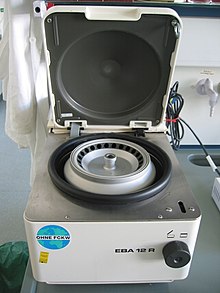Centrifuge tube

A tabletop laboratory centrifuge
|
|
| Uses | Separation |
|---|---|
| Related items |
Gas centrifuge Ultracentrifuge |
A laboratory centrifuge is a piece of laboratory equipment, driven by a motor, which spins liquid samples at high speed. There are various types of centrifuges, depending on the size and the sample capacity.
Like all other centrifuges, laboratory centrifuges work by the sedimentation principle, where the centripetal acceleration is used to separate substances of greater and lesser density.
There are various types of centrifugation:
There are different types of laboratory centrifuges:
(devices for small tubes from 0.2 ml to 2.0 ml (micro tubes), up to 96 well-plates, compact design, small footprint; up to 30,000 g)
(moderate-speed devices used for clinical applications like blood collection tubes)
(devices for a broad range of tube sizes, high variability, big footprint)
(analytical and preparative models)
Because of the heat generated by air friction (even in ultracentrifuges, where the rotor operates in a good vacuum), and the frequent necessity of maintaining samples at a given temperature, many types of laboratory centrifuges are refrigerated and temperature regulated.
There are different providers of laboratory centrifuges like Meditech, Eppendorf, Thermo-Heraeus, Thermo-Sorvall, Hettich, Beckmann-Coulter, MSE, Sigma and AWEL International.
Centrifuge tubes (also referred to as Eppendorf Tubes, Microfuge Tubes, and Microcentrifuge Tubes) are precision-made, high-strength tubes of glass or plastic made to fit exactly in rotor cavities. They may vary in capacity from 50 mL down to much smaller capacities used in microcentrifuges used extensively in molecular biology laboratories. Microcentrifuges typically accommodate disposable plastic microcentrifuge tubes with capacities from 250 μL to 2.0 mL.
Glass centrifuge tubes can be used with most solvents, but tend to be more expensive. They can be cleaned like other laboratory glassware, and can be sterilized by . They must be handled with care, since small scratches can cause failure under the strong forces imposed during a run. Glass tubes are inserted into soft rubber sleeves to cushion them during runs. Plastic centrifuge tubes, especially tend to be less expensive and, with care, can be just as durable as glass. Water is preferred when plastic centrifuge tubes are used. They are more difficult to clean thoroughly, and are usually inexpensive enough to be considered disposable.
...
Wikipedia
